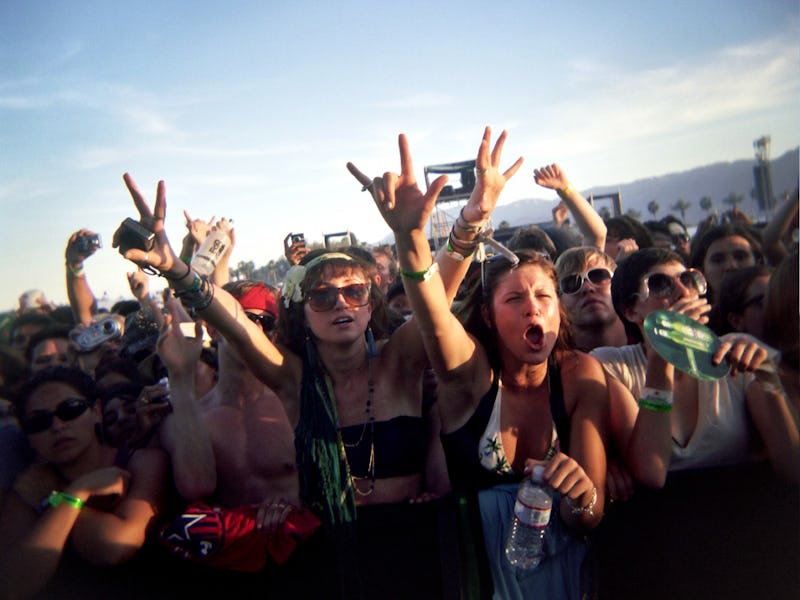Millennials Are Actually Happier Than Baby Boomers
Don't grow up, it's a trap.

Millennials might be a little mopey at work, but new research suggests that today’s young adults are actually pretty darn happy. A study from San Diego State University may have just upended the notion that happiness grows with age.
There are plenty of baby boomers willing to give millennials an earful about how spoiled and selfish the younger generation is. And there are just as many millennials who are stressed out about… well, just about everything. But new data published in the journal Social Psychological and Personality Science on November 5, 2015, claims that boomers are actually less happy than Generation Y.
Researchers at San Diego State University’s psychology department measured indicators of subjective well-being (SWB) in 1.32 million people of various age groups from 13-96 over a period of 30 years. Using this data, they found that the question of whether Americans are more or less happy than they have been in the past is pretty subjective — especially in relation to age.
To measure happiness, researchers asked each participant: “Taking all things together, how would you say things are these days—would you say you’re very happy, pretty happy, or not too happy these days?” Each response choice was coded with a 1, 2, or 3.
When gauging satisfaction, the team had a series of more specific questions. Participants were asked about how satisfied they were regarding: jobs, neighborhoods, personal safety, property safety, educational experiences, relationships with friends, relationships with parents, evaluation of self, standard of living, amount of leisure time, how that leisure time is actually spent, quality of their life as a whole, feelings about the government, and the amount of fun they are having. Each response was ranked on a scale of 1 (being “completely dissatisfied”) to 7 (being “completely satisfied”).
Researchers found that adolescents, high schoolers, and young adults today are happier than their adolescent counterparts of yesteryear. However, adults were generally happier than the adolescent crowds of 13- 18-year-olds (probably because… puberty and middle/high school are the worst). That gap in happiness levels lessened over time as both groups aged, though.
In the 1970s, adults over 30 were markedly happier than the emerging adult class, but that has changed completely over the past 40 years. Today’s 30-plus crowd is notably _un_happier than the previous generation of 30-somethings.
Researchers found that today’s “emerging adulthood” age range of 18-29 also possesses more positive SWB indicators than their baby boomer elders. (Happiness between early 20-somethings and late 20-somethings did not vary much.)
Data shows that for the first time (during the recorded 1972-2014 timespan) that the happiness levels of the 30 or older crowd has dipped below that of the 18- to 29-year-olds.
Happiness among 18- to 29-year-old adults and adults 30 or over by time period from 1972-2014.
The study points out that there are a couple reasons that differences in happiness levels may arise over several decades, like “time period” and “birth cohort/generation.” The former is a cultural change that affects people of all ages while the latter mostly affects people born at a certain time.
So why are boomers so bummed out?
A recent example of the differences in SWB between birth cohorts/generations (i.e. boomers v. millennials) may be found in the recent recession, which affected the working generation more so than it did students in 2008. (It should be noted that both generations did experience a plummet in happiness during the years 2005-2009 in the data.)
When students eventually had to deal with the realities of the recession during their own job hunts, their happiness levels were able to bounce back faster than that of the boomers (whose satisfaction levels didn’t seem to fully recover). Perhaps because the Gen X-ers had a period of increasing happiness (see years 1990 until about 2004) and the recession’s blow became a huge disappointment they couldn’t get over. Or maybe since millennials knew what was in store for them, they were able to prepare better for the future.
Other factors may affect the SWB indicators over time, and today’s society is experiencing a shift towards individualism. Increases in extroversion, self-esteem, narcissism, leisure time, physical health, and obtaining higher levels of education are all traits correlated with positive SWB. However, decreases in both marriage and birth rates suggest that relationships may be less stable and social support networks are becoming weaker, all of which can contribute to feelings of less satisfaction and general well-being.
So where does that leave Generation Y? We may hate the term “millennial,” but we’re not letting that stop us from going out and seizing the day, taking risks, and following our passions — which, incidentally, are all things that are traditionally associated with younger generations.
But hey, we’re just millennials still, so what do we know? Maybe The Breakfast Club was right after all.
Check back on us when we reach the big three-oh.